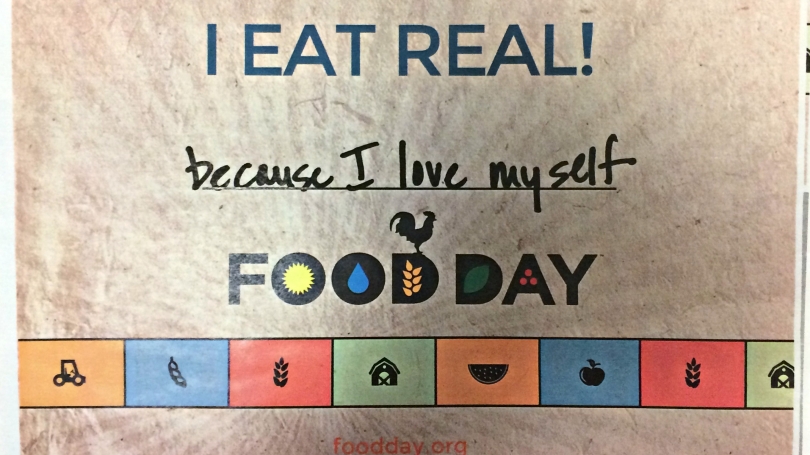
- About
- Departments & Services
- Projects
- Construction in Progress
- Service Requests
- News & Communications
Back to Top Nav
Back to Top Nav
Back to Top Nav
When college students are presented with delicious, nutritious, and sustainably-sourced foods, what happens? At Dartmouth College in Hanover, NH, the answers are written on the blackboard by deeply satisfied and happy students.
Student testimonials like: “Food Day Should be Every Day,” “Best Day Ever,” “Every Day Should be Harvest Day,” and more were written on a blackboard in one of Dartmouth’s dining facilities. And many more students weighed in with check marks and tick marks to amplify what the writers were feeling.
“Food Day” has evolved from its initial design in 2014 as a week-long celebration of local authors discussing healthy eating, snacking on apple at the Apple Crunch on the Hanover Town Green, and Harvest Dinner for students to cap off the week. In just three years, “Food Day” 2017 expanded organically into a Food Day Program that spans the first three weeks of October.
Events include pop-up apple stands around campus, a rally and tractor parade with local farmers, movies, the Harvest Dinner (of course), and a Harfest celebration at the Dartmouth College Organic Farm. Keynote speaker, Malik Kenyatta Yakini, Executive Director of the Detroit Black Community Food Security Network, came to campus this year to address students, faculty, staff, and members of the general public on the topic of “The Good Food Revolution: Freedom, Justice and Equity.”
The program creators, Beth Rosenberger, R.D., a dietitian with Dartmouth Dining Services, K.C. Wright, a nutritionist from Dartmouth’s “Dick’s House” healthcare office, and Anne Kapuscinski, a Professor in Environmental Studies who specializes in integrated food-energy systems, developed programming for students to focus on healthy eating habits, sustainable food sources, and learning about equal and better wages for farm and service workers in the food industry.
Dartmouth Dining Services oversees, prepares and serves the Harvest Dinner by highlighting the best of local and regional foods on its dinner menu. There’s an herbivore station, a cheese station thanks to Cabot Cheese of VT, local beef and venison for grilled burgers, and much, much more. Needless to say, students love it, and, on their way into dinner, they can meet and get to know local growers of the foods they’re about to eat.
Program coordinators identified several topics to address as priorities for the Food Day 2017 program. These include how to:
When food becomes not just delicious, nutritious, sustainable, locally-grown or humanely raised, but fun to learn about as well, that’s when the magic happens with students. Clearly, the evolution of Dartmouth College’s “Food Day” from a little seedling to a blossoming cornucopia of food that intrigues and delights students all around campus points to a new trend in food in Hanover. Student interest is high in where food is grown and how it makes it to their tables, along with learning about the “good food revolution” and international food sovereignty as addressed by Malik Kenyatta Yakini.
With good food on the table, along with information that helps students learn about this critical natural resource, it may not be long before food issues become the cream rising to the top within the realm of academia.